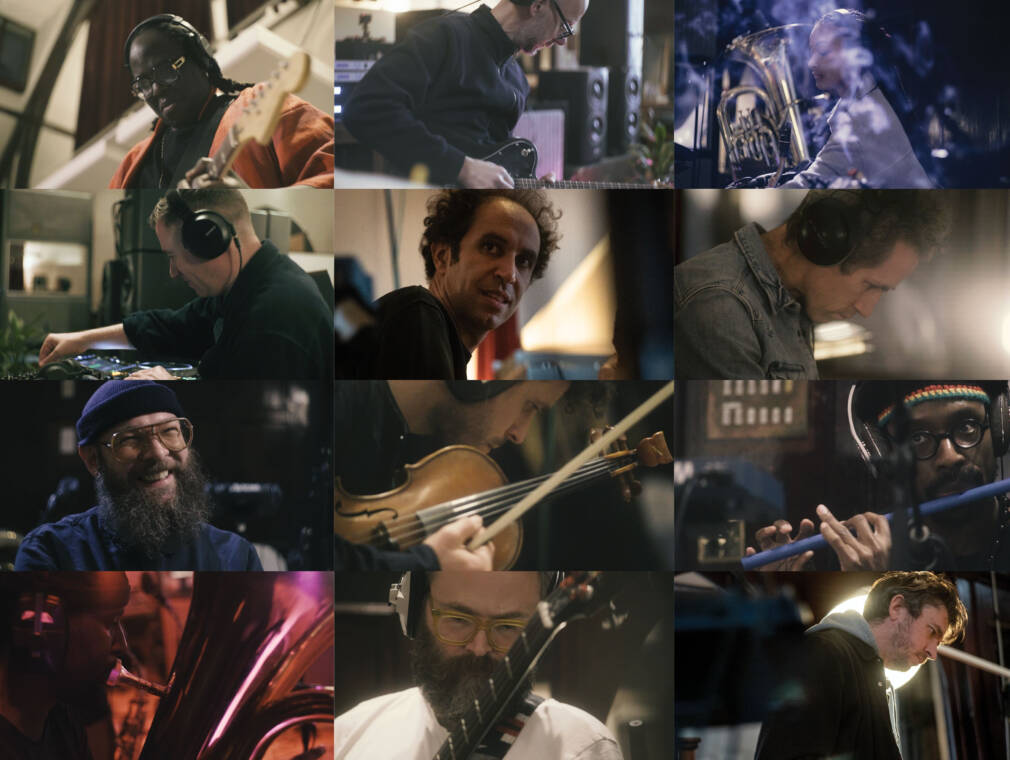As a bandleader Miles Davis famously told his musicians; “Don’t play what’s there, play what’s not there” his meaning being to play the next idea rather than what already existed. Nowhere is this instruction to charter new musical space more evident than on his 1970 release Bitches Brew. Now fifty years on, a who’s who of the London jazz scene have delivered on the same challenge to celebrate this avant-garde masterpiece.
It was the week after Woodstock when Miles called his musicians to the studio to record Bitches Brew. Assembled at Columbia’s Studio B were some of Miles’ regular sidemen including saxophonist Wayne Shorter, pianist Chick Corea, bassist Dave Holland, and drummer Jack DeJohnette. Others got the call at late notice, but all arrived with no knowledge of what was to be recorded and no music on paper. Instead, Miles provided pointers such as a tempo count, a few chords, a hint of harmony, and some scant suggestions as to mood or tone. A blank canvas to be filled.
Fast forward to London 2020 and big world events are also afoot. A lockdown rather than a hippy gathering provides the backdrop as gigs and festivals are canceled around the world. One such happening was a 50th-anniversary celebration of Miles’ masterpiece to be hosted at London’s Barbican Centre in November. The idea of USA-Swedish duo of producers Bruce H. Lampcov and Martin Terefe was not to be, as London’s venues sat empty, in the dark. The producers and musicians, however, refused to give up, and in December 2020 entered self-quarantine together in a studio (or more accurately a North London church) to respond to both Miles’ record and all that 2020 had thrown at them. In attendance were saxophonists Shabaka Hutchings and Nubya Garcia, tuba player Theon Cross, guitarist Dave Okumu and drummer Tom Skinner among other personnel.
The musicians were given no concrete instructions and merely asked to begin playing; “a note that described being in lockdown” explains producer Martin Terefe ahead of the March 31st release of the resulting album. Facing each other in the round (Miles assembled his musicians in a crescent) they began like their predecessors on Bitches Brew, by establishing a musical drone. With the tape rolling Okumu remembers; “In all my years of recording, I’d never been involved in an improvisatory process on this scale” and from here the titular opening track brews steadily as the London musicians begin to inhabit the empty space.
This continues on “London Brew 2” which welcomes in drum and bass, dub, and echoes of the sound system culture that percolate through London, all building to an incendiary fever before “Nu Sha Ni Sha Nu Oss Ra” arrives with its more incantatory, witchy feel. For Bitches Brew Miles recruited a brigade of rhythm section players, including two bassists, and two drummers who would be panned left and right in the finished stereophonic recording. Meanwhile, Miles hangs out in the upper register of his trumpet where he takes explosive aim. This is echoed on London Brew for which Theon Cross handles the bottom end, setting up “MorNing Prayers” with his immediately recognizable tuba.
Meanwhile, on the musical front line of the 2020 recording, it’s a rare opportunity to hear saxophonists Shabaka and Nubya in musical conversation, and possibly the last time on record for Hutchings who has announced a hiatus from saxophone to concentrate on his flutes (as anyone who follows Hutchings on Instagram will know – he got deep into flutes during lockdown as a daily practice during the one allocated walk). Whilst for Garcia the recording was a chance to explore the outer reaches of her instrument.
Reflecting on Davis’ track “Miles Runs the Voodoo Down” (inspired by Jimi Hendrix) she describes London Brew’s interpretation “Miles Chases New Voodoo In The Church” as a chance to celebrate; “innovators who carved their own lanes” continuing “for a while now I’ve been experimenting and using pedals and effects with my instrument, so to be able to do that on this track, while paying tribute to their legacies, was a joy both creatively and personally.” Bitches Brew also pioneered the use of the studio as a musical instrument with the aforementioned stereo panning and the heavy use of tape loops, delays, reverb, and echo.
Likewise, London Brew has been assembled from hours of tape and put back together, resulting in a sonic safari for the ears. Speaking of this soundscape, Terefe remembers of the session “Sometimes we were all looking around the room wondering ‘who’s doing that!’” so rich is the musical potion brewed up.“It felt like we had some kind of blessing from Miles,” concludes Terefe ahead of this exciting release which, like the original, is sure to reward with each revisit. “It felt like he was in the room with us.”




